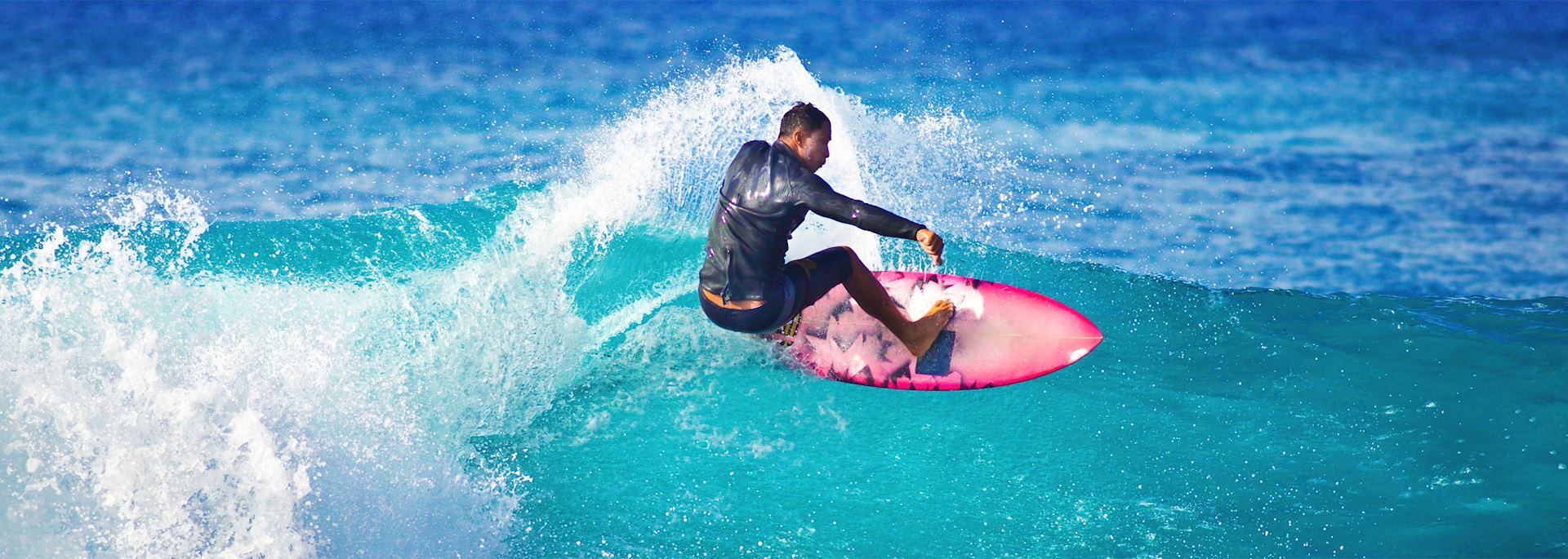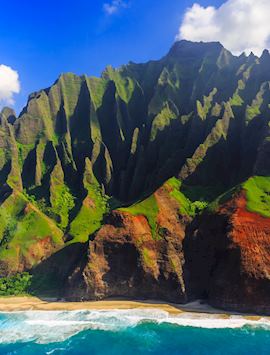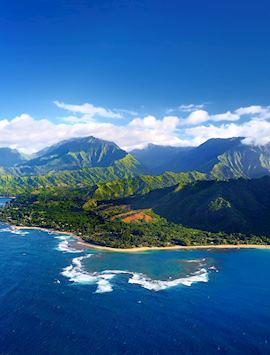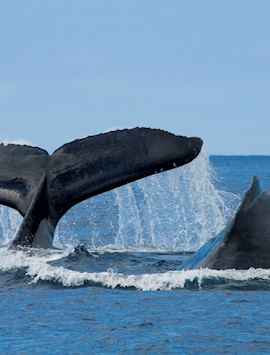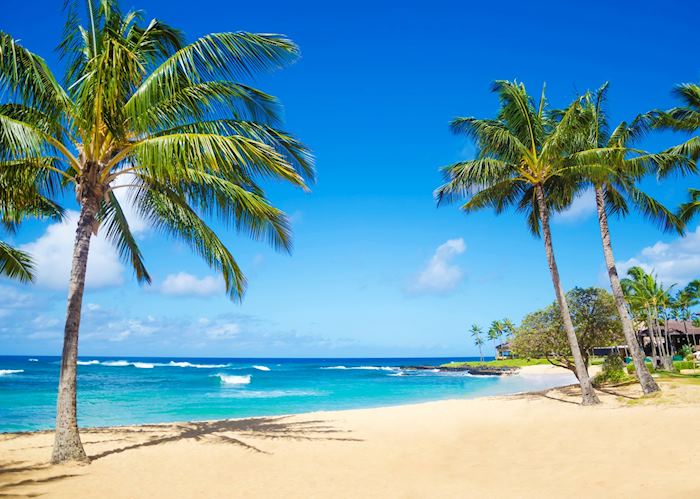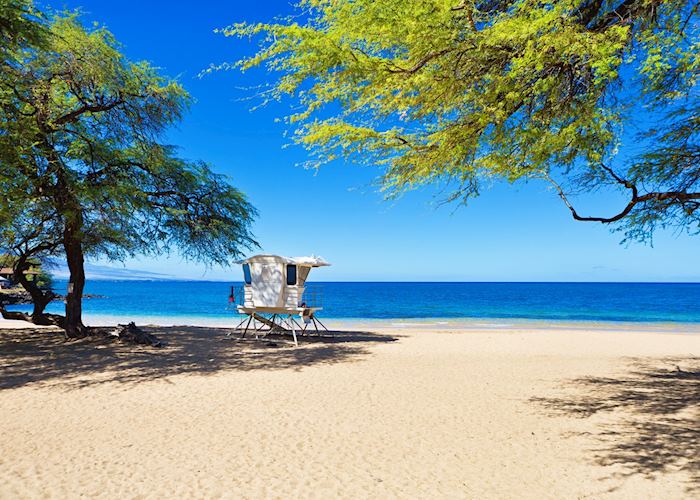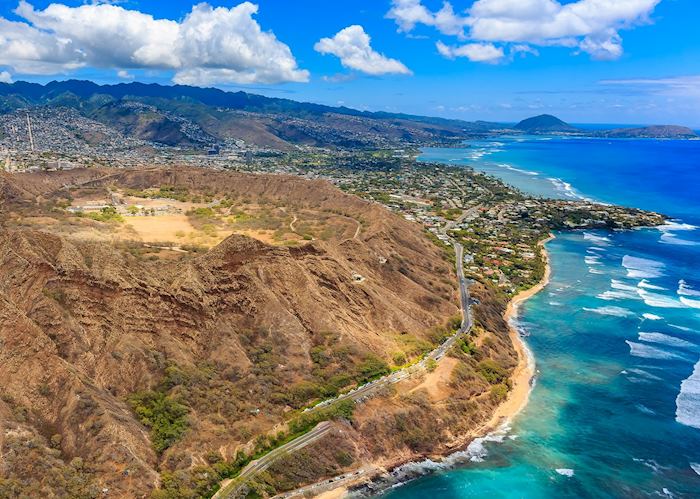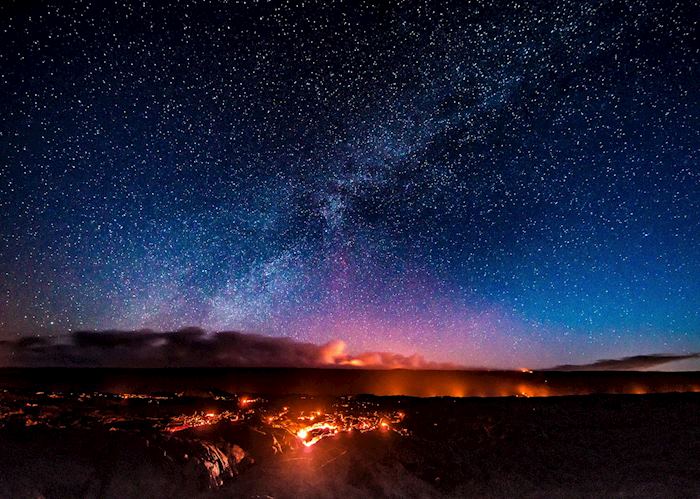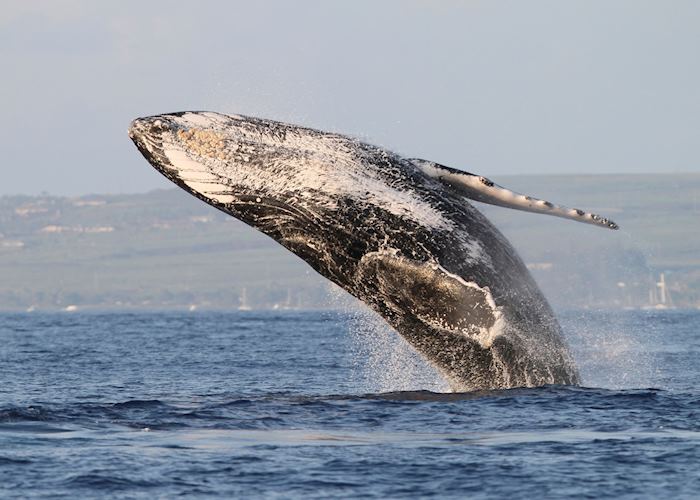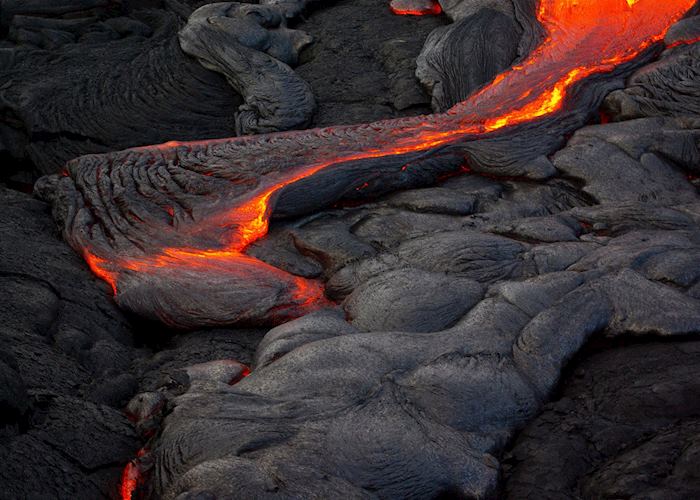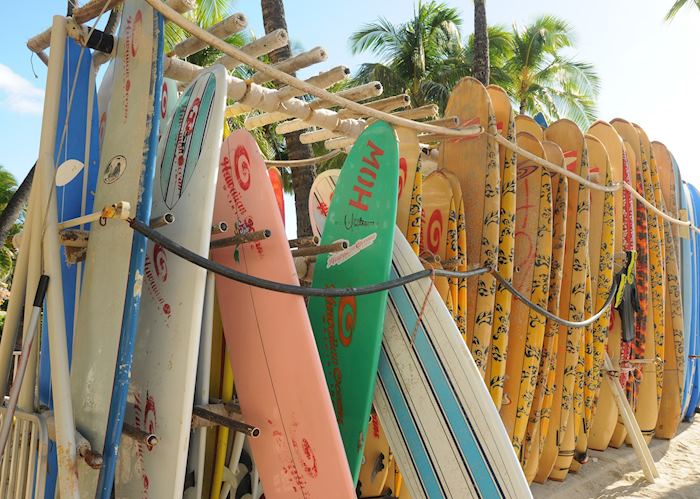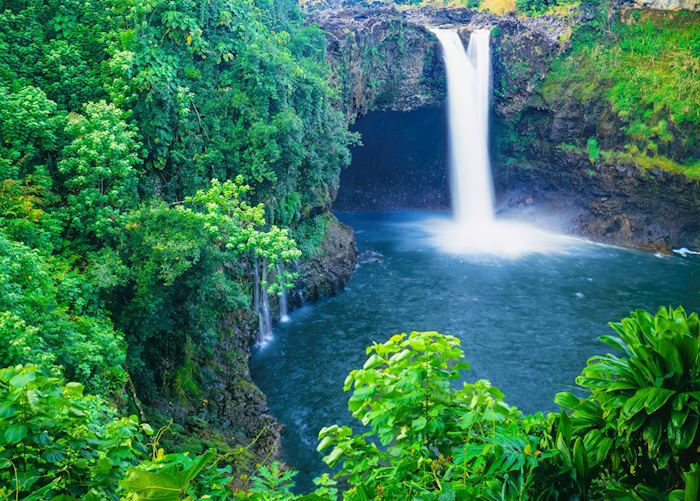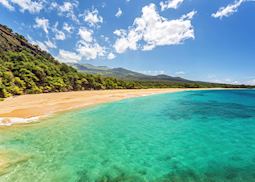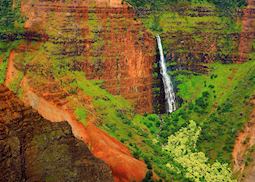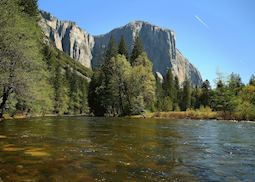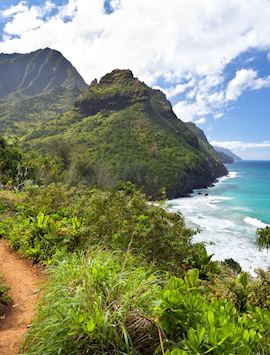
A string of far-flung islands in the middle of the Pacific, Hawaii conjures up images of tropical paradises with soft, golden beaches, swaying palms and lei-wearing hula dancers. It’s all true, but at the same time there’s much more to this archipelago. Our specialists have explored beyond the obvious and can use their first-hand knowledge to help you plan a tailor-made vacation to Hawaii with a difference.
The powerful volcanic forces that created Hawaii’s islands are still felt today, from the bubbling lava fields of Volcanoes National Park to the black volcanic beaches, partially submerged craters and dormant volcanoes scattered across the six main islands: The island of Hawaiʻi, Oʻahu, Kauaʻi, Maui, Molokaʻi and Lānaʻi. The coastline in some places is so distinctive that it has captured the imagination of Hollywood film-makers, and precipitous cliffs rise from the ocean like natural cathedrals. Tangled rainforest streaming with waterfalls covers much of the islands’ interiors, while offshore you can swim among coral reefs and look for humpback whales.
Suggested tours for Hawaii
These tours give you a starting point for what your vacation to Hawaii could entail. Treat them as inspiration, as each trip is created uniquely for you.
Why travel with Audley?
- 100% tailor-made tours
- Fully protected travel
- Established for over 25 years
- 98% of our clients would recommend us
Best time to visit
Our specialists advise on the best months to visit Hawaii, including information about climate, events and festivals.
Request our brochure
Covering all seven continents, The World Your Way shows you how you can see the world with us. It features trip ideas from our specialists alongside hand-picked stays and experiences, and introduces our approach to creating meaningful travel experiences.

Useful information for planning your vacation in Hawaii
Hawaiian and English are the official languages of Hawaii. You may also hear Hawaiian Creole English spoken, which is often called ‘Pidgin’ locally.
The currency of Hawaii is the US dollar (US$). All major credit cards are widely accepted, and you’ll find ATMs in most towns.
In Hawaii, you should try traditional dishes such as poke (marinated fish), manapua (steamed pork buns), and Huli-Huli chicken (chicken marinated in a soy glaze). Hawaiian food is influenced by traditions from Polynesia, China, and Japan and you’ll find everything from fish tacos to poi (mashed taro), and kālua pua’a (slow roasted pork) to haupia (coconut cream with arrowroot) on local menus.
Fresh juices, pineapple iced tea, and lots of fruity cocktails are also on offer.
Tips of between 15-20% are expected for all bar and restaurant services and about the same percentage should be applied to taxi fares.
For the latest travel advice for Hawaii, including entry requirements, health information, and the safety and security situation, please refer to the State Department website.
Hawaii offers powder-soft beaches, big surf, lush rainforests, active volcanoes, and abundant marine life. While here, you could hike through forested gorges, go whale watching, or see hot lava pour into the sea. You could take a helicopter ride over a smouldering volcano, hike along coastal trails, snorkel with manta rays at night, or take on some of the biggest waves in the world. You can also take in the poignant history of Pearl Harbor, go stargazing at Mauna Kea’s observatory or visit smaller islands to learn about traditional culture in small villages.
Hawaii offers a great range of places to stay, from sleek beachfront resorts with a choice of pools, restaurants, and water sports to more intimate guesthouses with local character.
Many hotels offer cultural activities such as lei-making and ukulele playing, or traditional feasts with music and dance. For five-star comfort in a secluded location, you could stay in a cliff-top suite overlooking the ocean or a beachfront villa or cottage. For something more intimate, you could opt for a traditional Hawaiian guesthouse, a rainforest chalet, or a secluded B&B. For more ideas browse out selection of places to stay in Hawaii.
Hawaii has six main islands, but most visitors go to Oʻahu, the island of Hawaiʻi, or Maui. Oʻahu is the most visited island, home to Hawaii’s capital, Honolulu, as well as the surfing hotspot of Waikīkī Beach, volcanic tuff cones, botanical gardens, and Pearl Harbor.
On the island of Hawaii, you can laze on soft sand beaches or visit coffee plantations in the west and explore an active volcanic landscape with hissing craters and smoking fumaroles in the east.
For tropical rainforest, scenic drives, black-sand beaches, and pristine reefs, Maui offers adventure and relaxation in equal measure. On Kauaʻi, you could sail along the dramatic Nā Pali coastline, while Lānaʻi and Molokaʻi offer a glimpse of traditional Hawaiian life and Polynesian culture.
Respecting local culture and customs, protecting the environment, and supporting local businesses are the best ways to travel responsibly in Hawaii. Hawaii’s magnificent landscapes are a major draw, but with high visitor numbers even small actions can have a negative impact.
When out hiking stick to the trails and follow the signs. This protects you from danger, respects ancestral lands, and ensures habitats around the trails are left undisturbed.
Dispose of your litter properly and consider actively helping by joining a beach clean-up, for example. Don’t feed wildlife and actively seek out insect repellent and sunscreen that won’t harm wildlife or marine life.
We can also help you choose stays and experiences that do good in the local community, from certified sustainable hiking tours to whale watching adventures that support vital research and education. You can speak to your specialist to find out more.
It takes around 11 hours to fly from the East Coast of continental USA to Hawaii and around six hours from the West Coast.
The time zone in Hawaii is UTC-10 hours. Daylight Savings Time is not observed.
The best way of getting around Hawaii is to combine car journeys with inter-island flights or boat trips. It’s easy to hire a car on the larger islands to drive between sights, but if you want to see more than one island you’ll need to fly or take an inter-island cruise.
US citizens don’t need a visa for Hawaii.
Your doctor is best placed to give vaccine advice for Hawaii. You should ensure you’re up to date with the recommended vaccinations for your home country.
US citizens don’t need a passport to visit Hawaii, just valid government photo ID.
In Hawaii, you should be aware of local customs such as aloha, which is a way of life rather than just a greeting. Aloha means welcoming people, being friendly, and treating people with respect. This can mean anything from greeting people with a smile and taking the time to talk to them to driving without aggression.
Hawaiian customs also respect the land and wildlife, so don’t take rocks off beaches, hike off-trail, or feed wildlife. Hawaiian lei (flower garlands) are considered a sign of love and respect, so don’t throw them away when they wilt. Instead, take them apart and put any natural elements back into nature and then dispose of any plastic elements properly.
Hawaiian culture is all about respect for people, the land, and wildlife. Hawaiians like to ‘talk story’, to stop and have a conversation, so slow down and chat to people. Don’t speed on the roads or honk your horn while driving, and don’t refer to the continental US as the mainland. To Hawaiians, the Island of Hawaii is the mainland. Call places by the Hawaiian names, and if you’re invited to someone’s house, bring a small gift or some food and remove your shoes before entering.
Hawaii in pictures
Our expert guides to traveling in Hawaii
Written by our specialists from the viewpoint of their own travels, these guides will help you decide on the shape of your own trip to Hawaii. Aiming to inspire and inform, we share our recommendations for how to appreciate Hawaii at its best.
-
What to do in Hawaii: our highlights guide ![Makena Beach, Maui]()
What to do in Hawaii: our highlights guide
What to do in Hawaii: our highlights guide
There’s more to Hawaii than just beaches, according to US specialist Gillian. With six main islands to discover, you can spend your days exploring ever-changing volcanic landscapes, snorkeling with manta rays, taking a helicopter flight over cliffs, and soaking up the Polynesian culture.
Read this guide -
Sustainable ways to explore Hawaiʻi ![Waimea Canyon, Kauai]()
Sustainable ways to explore Hawaiʻi
Sustainable ways to explore Hawaiʻi
Caring for the natural world is deeply ingrained in Hawaiian life, so giving back while you travel is one way to connect more meaningfully with Hawaiʻi’s people, culture, and landscapes. USA specialist Carl shares his recommendations for a sustainable trip.
Read this guide -
Self-driving in Hawaii ![Diamond Head, Waikiki, Hawaii]()
Self-driving in Hawaii
Self-driving in Hawaii
Hawaii is known for its powdery beaches and swaying palms, but the islands of this tropical archipelago have much more to offer. One of the best ways to experience Hawaii away from the crowds is on a fly-drive tour, giving you the flexibility and freedom to immerse yourself in the culture and history of the Aloha state at your own pace.
Read this guide -
Honeymoons in the US ![Merced River & El Capitan, Yosemite National Park]()
Honeymoons in the US
Honeymoons in the US
As a honeymoon destination, the United States has a lot to offer. US specialist, Carl, picks some of his top choices, from exploring San Francisco and driving the Pacific Coast Highway to staying on a ranch in the Rocky Mountain states and experiencing the swamplands and culture of Louisiana.
Read this guide
